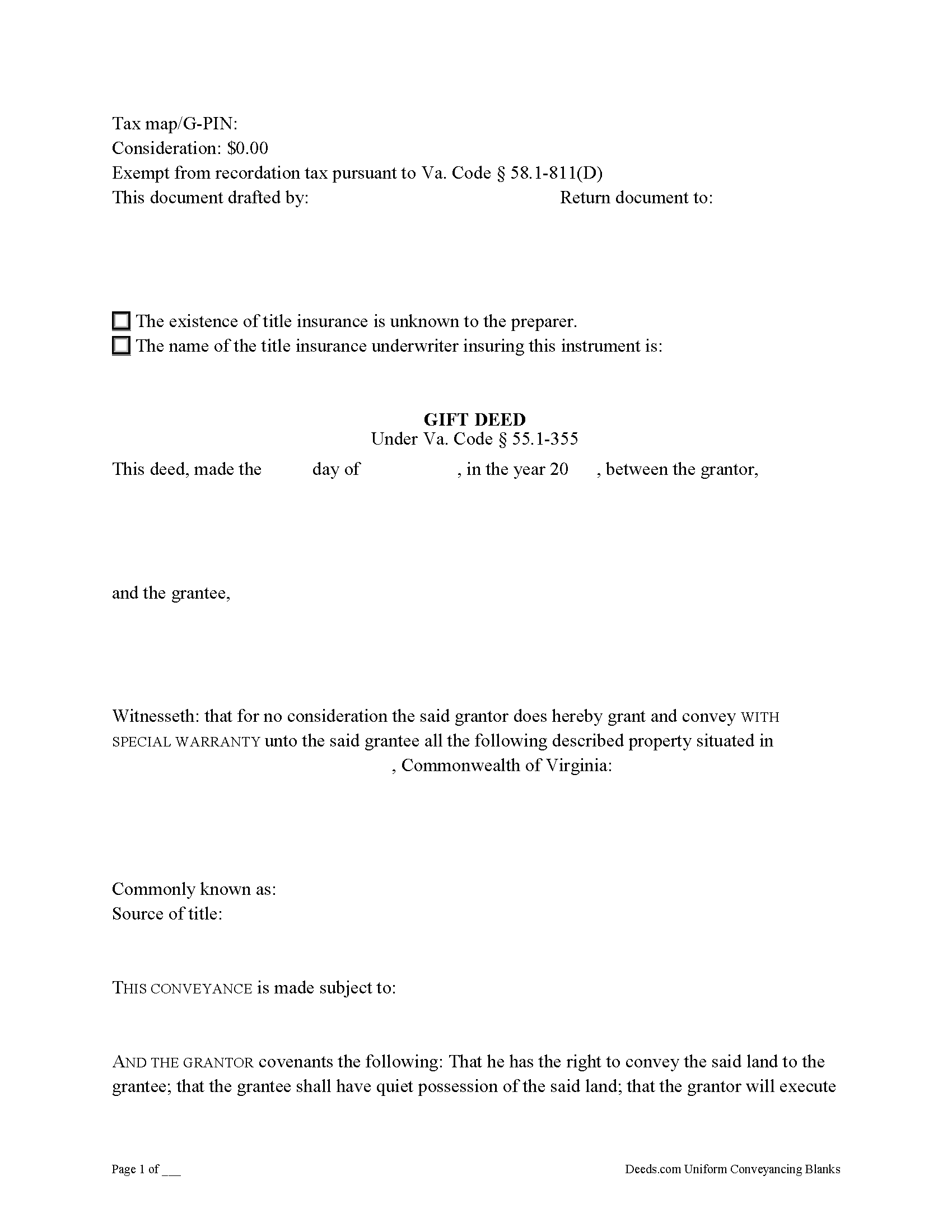Download Virginia Gift Deed Special Warranty Legal Forms

Virginia Gift Deed Special Warranty Overview

A gift deed, or deed of gift, is a legal document voluntarily transferring title to real property from one party (the grantor or donor) to another (the grantee or donee). They typically transfer real property between family or close friends. Gift deeds are also used to donate to a non-profit organization or charity.
Gift deeds, by definition, are transfers made for no consideration. To gift property to a donee, the donor may execute a quitclaim, special warranty, or warranty deed, depending on the level of protection they wish to provide. In general, though, gift deeds with full warranties are unusual; most donors choose either quitclaim or special warranty deeds.
Quitclaim deeds transfer the owner's property rights to the recipient with no assurances about the status of the title, or even a guarantee that they have actually own the property. Special warranty deeds confirm that the donor owns the property, has the right to transfer it, and will defend the donee against claims on the title that relate to their period of ownership.
For a gift deed to be valid, the grantor must intend to make a gift of the property, deliver the property to the grantee, and the grantee must accept the gift. It must contain language that explicitly states no consideration is expected or required. Any ambiguity or reference to consideration can make the deed contestable in court. A promise to transfer ownership in the future is not a gift, and any deed that does not immediately transfer the interest in the property, or meet any of the aforementioned requirements, can be revoked.
A lawful gift deed includes the grantor's full name and marital status, as well as the grantee's full name, marital status, mailing address, and manner of vesting title. As with any conveyance of real estate, a gift deed requires a complete legal description of the parcel. Recite the source of title to establish a clear chain of title, and detail any restrictions associated with the property.
The granting party must sign the deed in the presence of an authorized official before filing the deed in the Clerk of Court's office in the independent city or county in which the property is situated. If married, the non-owning spouse should sign as an additional grantor to waive any interest in the estate. Gift deeds must meet all state and local standards for recorded documents. Some jurisdictions in Virginia require a cover page for recording. Generate the cover sheet online and submit it when recording (see supplemental forms). Contact the local recording office with questions.
Deeds of gift are exempt from recordation taxes under Va. Code 58.1-811(D). The deed must state on its face that the transfer is exempt from the tax.
Virginia does not levy a state gift tax, but the grantor must pay the Federal Gift Tax. The IRS implements a Federal Gift Tax on any transfer of property from one individual to another with no consideration, or consideration that is less than the full market value. As of 2020, individuals are permitted an annual exclusion of $15,000 on gifts. If there is any question about the gift's value, or if it is close to the exclusion limit, the grantor may wish to consider filing a Form 709 for the federal tax. Ask the local tax assessor or another tax professional for guidance.
With gifts of real property, the recipient (grantee) is not required to declare the amount of the gift as income, but if the property accrues income (such as rent) after the transaction, the recipient is responsible for paying associated state and federal income taxes. Note that the grantee, as the new owner, also becomes responsible for local property taxes and maintaining other agreements and restrictions associated with the property.
This article is provided for informational purposes only and is not a substitute for professional legal advice. Contact an attorney with questions about gift deeds or for any other issues related to the transfer of real property in the Commonwealth of Virginia.
(Virginia GDSW Package includes form, guidelines, and completed example)